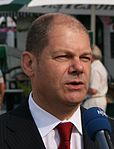The 2011 Hamburg state election was held on 20 February 2011 to elect the members of the 20th Hamburg Parliament. The election was triggered by the collapse of the coalition government between the Christian Democratic Union (CDU) and the Green Alternative List (GAL), which had governed the state since 2008.[1] The election was a landslide defeat for the CDU, which lost half its voteshare and seats. The margin of defeat for the incumbent Ahlhaus Senate is the largest in post-war German history and has not been met since. Much of this lost support flowed to the Social Democratic Party (SPD), which won 62 of the 121 seats in Parliament, forming a majority government led by Olaf Scholz.[2][3]
| |||||||||||||||||||||||||||||||||||||||||||||||||||||||||||||||||||||||||||
All 121 seats in the Hamburg Parliament 61 seats needed for a majority | |||||||||||||||||||||||||||||||||||||||||||||||||||||||||||||||||||||||||||
|---|---|---|---|---|---|---|---|---|---|---|---|---|---|---|---|---|---|---|---|---|---|---|---|---|---|---|---|---|---|---|---|---|---|---|---|---|---|---|---|---|---|---|---|---|---|---|---|---|---|---|---|---|---|---|---|---|---|---|---|---|---|---|---|---|---|---|---|---|---|---|---|---|---|---|---|
| Turnout | 3,444,602 (57.3%) | ||||||||||||||||||||||||||||||||||||||||||||||||||||||||||||||||||||||||||
| |||||||||||||||||||||||||||||||||||||||||||||||||||||||||||||||||||||||||||
| |||||||||||||||||||||||||||||||||||||||||||||||||||||||||||||||||||||||||||
Background
editAfter the 2008 state election, the CDU formed a coalition government with the GAL. This was the first time such a government had been formed in Germany, as the Greens were seen as aligned with the SPD, typically in opposition to the CDU. Popular CDU mayor Ole von Beust was seen as a stabilising force for the government. After his retirement in August 2010 and the election of Christoph Ahlhaus as his successor, relations between the two parties became increasingly strained.[1][4][5] In November 2010, GAL left the government.[6] Ahlhaus formed a minority CDU Senate and the Parliament subsequently voted to dissolve itself and hold early elections.[7]
Parties
editThe table below lists parties represented in the 19th Hamburg Parliament.
| Name | Ideology | Leader(s) | 2008 result | |||
|---|---|---|---|---|---|---|
| Votes (%) | Seats | |||||
| CDU | Christian Democratic Union of Germany Christlich Demokratische Union Deutschlands |
Christian democracy | Christoph Ahlhaus | 42.58% | 56 / 121
| |
| SPD | Social Democratic Party of Germany Sozialdemokratische Partei Deutschlands |
Social democracy | Olaf Scholz | 34.15% | 45 / 121
| |
| GAL | Green Alternative List Grün-Alternative-Liste Hamburg |
Green politics | Anja Hajduk | 9.58% | 12 / 121
| |
| Linke | The Left Die Linke |
Democratic socialism | Dora Heyenn | 6.45% | 8 / 121
| |
Opinion polling
edit| Polling firm | Fieldwork date | Sample size |
CDU | SPD | GAL | Linke | FDP | Others | Lead |
|---|---|---|---|---|---|---|---|---|---|
| 2011 state election | 20 Feb 2011 | – | 21.9 | 48.4 | 11.2 | 6.4 | 6.7 | 5.5 | 26.5 |
| GMS | 15–17 Feb 2011 | 1,002 | 25 | 43 | 15 | 6 | 5 | 6 | 18 |
| Infratest dimap | 8–10 Feb 2011 | 1,004 | 23.5 | 45 | 14 | 5.5 | 5 | 7 | 21.5 |
| Forschungsgruppe Wahlen | 7–10 Feb 2011 | 1,686 | 23 | 46 | 14.5 | 6 | 5 | 5.5 | 23 |
| Emnid | 4–10 Feb 2011 | 1,002 | 24 | 45 | 15 | 6 | 5 | 5 | 21 |
| Infratest dimap | 28 Jan–2 Feb 2011 | 1,000 | 25 | 46 | 14 | 6 | 5 | 4 | 21 |
| Trend Research Hamburg | 26–31 Jan 2011 | 627 | 25 | 45 | 16 | 6 | 4 | 4 | 20 |
| Infratest dimap | 7–11 Jan 2011 | 1,000 | 26 | 43 | 17 | 5 | 4 | 5 | 17 |
| Trend Research Hamburg | 10–14 Dec 2010 | 648 | 24 | 45 | 16 | 8 | 3 | 4 | 21 |
| Infratest dimap | 10–12 Dec 2010 | 1,000 | 22 | 43 | 19 | 7 | 4 | 5 | 21 |
| Trend Research Hamburg | 2–7 Dec 2010 | 678 | 22 | 45 | 17 | 7 | 3 | 6 | 23 |
| Trend Research Hamburg | 29 Nov–2 Dec 2010 | 653 | 24 | 44 | 17 | 7 | 4 | 5 | 20 |
| Psephos | 29 Nov–1 Dec 2010 | 1,002 | 28 | 45 | 14 | 6 | 3 | 4 | 17 |
| Forschungsgruppe Wahlen | 29–30 Nov 2010 | 1,006 | 22 | 41 | 21 | 7 | 4 | 5 | 19 |
| Psephos | 6–10 Nov 2010 | 1,004 | 35 | 40 | 12 | 6 | 4 | 3 | 5 |
| Trend Research Hamburg | 15–19 Oct 2010 | 612 | 25 | 35 | 17 | 11 | 4 | 8 | 10 |
| Psephos | 19–20 Jul 2010 | 1,005 | 35 | 41 | 10 | 6 | 4 | 4 | 6 |
| Psephos | 29 Jun–2 Jul 2010 | 1,007 | 36 | 39 | 11 | 6 | 5 | 3 | 3 |
| Psephos | 19–23 Apr 2010 | 1,004 | 34 | 37 | 10 | 8 | 8 | ? | 3 |
| Infratest dimap | 17–21 Feb 2009 | 1,000 | 31 | 31 | 16 | 10 | 7 | 5 | Tie |
| Psephos | December 2009 | 1,001 | 38 | 34 | 11 | 8 | 6 | 3 | 4 |
| Psephos | 26–30 Nov 2009 | 1,004 | 36 | 33 | 13 | 8 | 8 | 2 | 3 |
| Infratest dimap | 19–22 Feb 2009 | 1,000 | 36 | 33 | 12 | 8 | 9 | 2 | 3 |
| Psephos | 22–27 Nov 2008 | 1,003 | 44 | 31 | 11 | 6 | 5 | 3 | 13 |
| Psephos | 29 April–5 May 2008 | 1,004 | 43 | 34 | 10 | 7 | 4.5 | 1.5 | 9 |
| 2008 state election | 24 Feb 2008 | – | 42.6 | 34.1 | 9.6 | 6.4 | 4.8 | 2.5 | 8.5 |
Election result
edit| Party | Votes | % | +/– | Seats | +/– | |
|---|---|---|---|---|---|---|
| Social Democratic Party (SPD) | 1,667,804 | 48.42 | 14.27 | 62 | 17 | |
| Christian Democratic Union (CDU) | 753,805 | 21.88 | 20.70 | 28 | 28 | |
| Green Alternative List (GAL) | 384,502 | 11.16 | 1.58 | 14 | 2 | |
| Free Democratic Party (FDP) | 229,125 | 6.65 | 1.90 | 9 | 9 | |
| The Left (Linke) | 220,428 | 6.40 | 0.05 | 8 | ||
| Pirate Party Germany (Piraten) | 73,126 | 2.12 | 2.12 | 0 | ||
| Others | 115,812 | 3.36 | 1.68 | 0 | ||
| Total | 3,444,602 | 100.00 | – | 121 | – | |
| Registered voters/turnout | 57.3 | 6.2 | ||||
See also
editReferences
edit- ^ a b c "Hamburg vote set for February after coalition collapses". The Local. 29 November 2010. Retrieved 29 November 2010.
- ^ "Merkel's party hammered in state elections". Deutsche Welle. 20 February 2011. Retrieved 20 February 2011.
- ^ Pidd, Helen (20 February 2011). "Angela Merkel's Christian Democrats suffer heavy Hamburg defeat". The Guardian. Retrieved 3 April 2011.
- ^ "Germany's only CDU-Green coalition falls". The Local. 28 November 2010. Retrieved 29 November 2010.
- ^ Knight, Dennis (February 18, 2011). "Trend-Setting Loss Would Spell Trouble for Merkel". Spiegel Online. Retrieved February 18, 2011.
- ^ "Veit Medick: 'Union schäumt, SPD träumt. Koalitionsbruch in Hamburg.'" Der Spiegel, 28 November 2010
- ^ "Greens in Hamburg end coalition with CDU". Deutsche Welle. 29 November 2010. Retrieved 28 November 2010.




